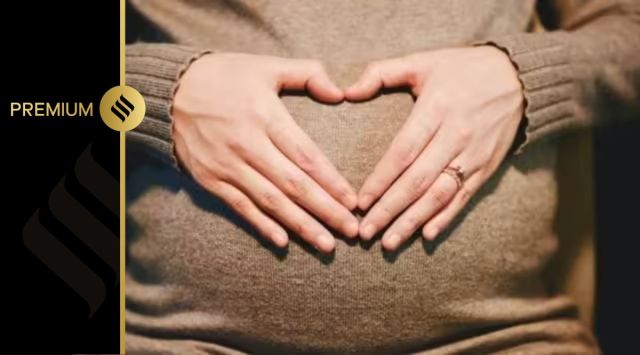Stating that the rights of a woman “must trump” when it comes to a request for Medical Termination of Pregnancy (MTP), the Supreme Court said Thursday it will also have to “balance out the rights of the unborn child”.
“We can’t kill the child,” said Chief Justice of India D Y Chandrachud who was heading a three-judge bench that took up a married woman’s request for ending her 26-week pregnancy, a day after a two-judge all-woman bench disagreed on giving the go-ahead for the MTP procedure and referred her plea to the CJI.

On Wednesday, while Justice B V Nagarathna said the petitioner’s “decision” not to continue with the pregnancy “must be respected”, Justice Hima Kohli said “my judicial conscience does not permit” to accept her request because “which court will say stop the heartbeat of a foetus which has a life”.
Story continues below this ad
The bench of CJI Chandrachud and Justices J B Pardiwala and Manoj Misra asked the woman if she was willing to wait a few more weeks in which case the child would have a better chance of being born healthy and could be given for adoption if she wished.
It asked Advocates Amit Mishra and Rahul Sharma, counsel for the woman, and Additional Solicitor General Aishwarya Bhati, who appeared for the Centre, to talk to her. The matter will be heard again Friday.
On Tuesday, a doctor from AIIMS, in a communication to the ASG, had said the foetus appeared to be “viable” indicating a “strong possibility of survival”.
Taking up the woman’s plea, the CJI said, “In these matters, consistent as we are about the need for maintaining her autonomy, we can’t be oblivious of the rights of the unborn child… We also need to balance out the rights of the unborn child. Undoubtedly, the autonomy of the woman must trump… She has rights under various provisions of the Constitution. But equally, you have to be conscious of the fact that ultimately, whatever you are doing is going to affect the rights of an unborn child.”
Story continues below this ad
Referring to the AIIMS report that the foetus was normal but ran the risk of being born with physical and mental deformities if taken out now, the CJI said, “We have to also balance out because, let’s put it very bluntly, either we kill the child or we ensure that the day the child is delivered in a state where the child is bound to be born deformed and deformed for life. We can’t kill the child.”
“Of course, in a given case we may exercise that overriding discretion, for instance, a child who has been subjected to sexual abuse, a girl who does not know she has been subjected to forcible sexual intercourse, and doesn’t know what is happening to her… The judge’s task is all about balancing rights. Balancing duties, balancing what is in the social good. I find it very difficult to come to terms with this order (allowing abortion) actually,” he said.
“You are conscious of the fact that if the child is born alive right now, there is a very high risk that, the doctors say, the child will be born with serious physical and mental deformities. Not because the child has a genetic defect but because we are pursuing a delivery at this point of time. The doctor says wait for some more weeks and then, in all probability, it will be a normal child… Now the question is whether she can wait for two more weeks. We are not compelling her to keep the child. The State doesn’t say that you must keep the child. But having waited for 26 weeks… to put the child to death is the only other option. All that she has to do is wait another two weeks,” the CJI said.
The woman’s counsel said the petitioner is not able to even take care of herself and learnt of the pregnancy only in the 24th week as she has been suffering from lactational amenorrhea and depression.
Story continues below this ad
To the bench’s query if the petitioner was willing to wait for some more weeks, her counsel said which mother would agree to part with her child after waiting for a full 9 months and delivering.
The CJI said, “What about a mother who knows that if I deliver today and don’t keep the baby for another two weeks, I am going to deliver a child who is destined to be abnormal physically and mentally. It’s a Hobson’s choice.”
Noting that the woman had already said no to allowing foeticide but didn’t want to keep the child even if it survived, he said, “She doesn’t want the child and wants to do an abortion. Then why doesn’t she do it a few weeks down the line? In that case, the child will have a better chance of survival. It’s a viable child. It’s not strictly speaking an MTP. They are saying look, we can in that sense do an MTP only by stopping the foetal heart, which is really that they are going to put an end to the life of the child. That’s why AIIMS had a serious ethical dilemma.”
Justice Pardiwala asked the woman’s counsel to understand what the court was trying to say.
Story continues below this ad
“Either we permit the doctors to stop the heart, which is called foeticide, which you said don’t do it… the foetus at the age of 26 weeks is being taken out and put in neonatal care… But there is an inherent danger in this. If we take out the foetus today, put it in neonatal care… it will grow with mental and physical deformities. Why do you want to do this? … Persuade your client, keep this pregnancy, deliver when the time comes, when nature says it’s time to deliver. Then the infant will be taken care of by the State”.
“It’s 26 weeks today. Normally, an infant is delivered in nine months, that is 36 weeks. What is falling from My Lord is that we may not wait the full term but direct the procedure to be carried out after 8 months,” he said.









